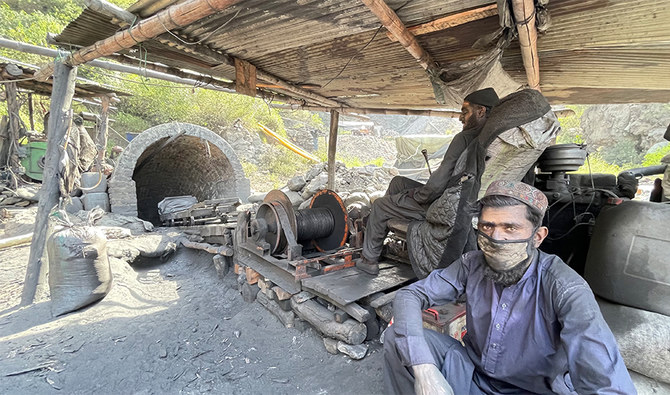PESHAWAR: At least 30 coal miners from Pakistan’s Shangla district have been diagnosed with tuberculosis (TB) in the past three weeks after health authorities in northwestern Khyber Pakhtunkhwa launched a screening project to monitor, for the first time, cases of the world’s most infectious disease in the province.
Pakistan each year reports over half a million cases of tuberculosis, more than 60,000 of them in Khyber Pakhtunkhwa. There is no reliable data on how many coal miners are affected by the disease in the country.
Over 70 percent men from Shangla above the age of 18 are involved with the coal mining industry and develop respiratory diseases after working for five to six years, provincial minister for labor and culture, Shaukat Ali Yousafzai, told Arab News.
What makes the problem worse is the COVID-19 pandemic, which is derailing global and national efforts to tackle tuberculosis. Last year, the World Health Organization Disruptions said the pandemic had led to major setbacks to tuberculosis programs, as human, financial and other resources were reallocated from tuberculosis to the coronavirus response in many countries, including Pakistan.

An ‘End TB' campaign mobile truck parked near the Peshawar Press Club offers free screenings to coal miners in Peshawar, Pakistan, on Feb 25, 2021 (AN Photo)
Assistant district health officer for Shangla, Dr. Ghafoor Ahmad, said authorities had launched a tuberculosis screening drive on May 8 to monitor the number of cases — the first such exercise in the province.
“Sputum samples are sent to five hospitals in the district,” Ahmad said. “We are expecting between 250 to 300 tuberculosis cases at the end of the six-week screening process.”
Secretary general of the Pakistan Mine Workers Federation, Sarzameen Khan, said the true number of tuberculosis cases was much higher since many coal miners had gone back to their places of work after last month’s Eid Al-Fitr holidays without being screened.
The federation’s meagre records for coal miners with tuberculosis were the only ones available in the province before the government launched last month’s screening drive to collect official data.
“A majority of the estimated 90,000 coal miners in the country belong to Shangla,” he said. “About 97 miners in Shangla and 64 in Pabbi [another district in Khyber Pakhtunkhwa] registered with us last year as critically ill. At least 77 mineworkers in Pabbi have died due to the disease in the last two decades.”

Young miners covered in coal dust at Akhorwal, Dara Adam Khel, Pakistan, on May 29, 2021 (AN Photo)
Former vice-chancellor of Khyber Medical University Peshawar, Dr. Arshad Javaid, told Arab News he had been advocating better conditions and health services for coal miners for the past two decades.
“In my 30-year experience as a doctor, most patients suffering from serious lung diseases that I examined belonged to Shangla,” he said.
Coal miners like 22-year-old Bacha Hussain, who works in Dara Adam Khel, too lamented working conditions and lack of health facilities.

A worker is seen as a nearby tractor loads coal onto a truck in Dara Adam Khel, Pakistan, on May 29, 2021 (AN Photo)
“We work, eat and live together and I fear sometimes that we will all die together,” he said. “I have a severe cough, but I cannot leave my work and go for a medical checkup to a doctor.”
Almost all mineworkers in Dara Adam Khel perform their jobs without proper gear, Hussain said. While some used safety hats, only a handful use masks or safety shoes.
“Masks cause a lot of suffocation inside a mine and most workers prefer to work without them since it makes it easier for them to breathe,” Hussain said.

Workers load coal sacks onto a pushcart in Dara Adam Khel, Pakistan, on May 29, 2021. (AN Photo)
Officials like Yousafzai say health conditions can be better monitored if all mineworkers from Shangla are registered with the provincial Employees’ Social Security Institution or the federal Employees’ Old Age Benefits Institution so they are entitled to the same benefits other laborers receive.
Special Assistant to KP Chief Minister for Mines and Minerals, Muhammad Arif Ahmadzai, said his ministry had ordered all mine owners in the province to register their workers.
“We have provided them with registration forms,” he said. “Workers are asked to get themselves registered. They are encouraged to report any mine owner or leaseholder who denies them the chance to register.”
Ahmadzai said the government also planned to increase the number of grants for coal workers.
“The one-time disability grant has been increased to Rs300,000 per person,” he said, “while I am trying to increase the death grant from Rs300,000 to half a million rupees.”
















